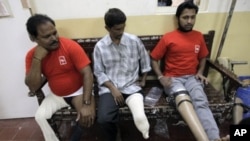Losing a limb is traumatic in any circumstances, but it can become a poverty trap for those without access to advanced medical care. The Indian state of Rajasthan is home to one of the world's largest charities devoted to empowering amputees by giving them new prosthetic limbs, and a new life.
Two-year-old Vaishnavi's mother loves her very much. She takes good care of her daughter and handles her surprisingly well - considering she has no arms.
Sangeeta explains that she lost her arms as a result of electrocution. She says she was working near electrical lines and water spilled onto a metal rod she was carrying.
She and her family have come to this Jaipur facility to receive a set of replacement arms.
It is known locally as Bhagwan Mahaveer Viklang Sahitya Samiti, but more commonly referred to by its most famous product: "Jaipur Foot."
More than one and a quarter million patients have received prosthetic legs, knees, arms, and hands produced by the facility since it was founded in 1975.
"Nobody has to write to us," said Mehta. "They just walk in. Immediately they arrive, they are admitted. They are given food. They are given all facilities, given limbs in two or three days and they go back."
D.R. Mehta, a former civil servant, started Jaipur Foot after an accident decades ago nearly cost him his own foot. The months he spent recovering in the hospital put him in contact with fellow Indians who were not so fortunate - most of them from among the country's poorest people.
"Losing a limb also meant losing economic status," he said. "They [the victims] cease to be useful. They lose respect even in the house."
Sangeeta understands very well the economic burden a lost limb can put on an entire family.
She says cooking food is a big problem. Her husband does the cooking, she says, so he often is late to work or cannot work at all. She says they sometimes have to ask the neighbors for help. It's a big hassle, she says.
"It's so satisfying for me, personally," said Mehta. "A person comes in crawling. He gets a limb in a day or two, for no charge at all, and walks out - like you and me, making a truncated being whole again. Seeing them going back and working in the field, working in the factory, it's not merely giving a limb - it's restoring their economic power."
Even patients who could afford other treatment options come to Jaipur Foot because of its reputation for quality.
"I'm from Penang, Malaysia. When I was nine, I had an accident. A truck ran over me and they couldn't save the foot," said a female patient. "So I've been wearing a prosthesis since I was nine, and I'm 40 now. I came to get a new prosthesis. It's always been a dream to come to Jaipur to get a Jaipur prosthesis. So it's like a dream come true. I can't wait to get moving!"
Jaipur Foot receives about a third of its funding directly from the Indian government. The rest comes from corporate and private donors.
It operates limb replacement camps in Pakistan, Sri Lanka, Afghanistan and many other countries where war and landmines have robbed people of limbs.
As for Sangeeta - it will take some time and practice for her to master using her new limbs to grasp objects. She says she looks forward to resuming work in the kitchen - and to brushing her own hair.




